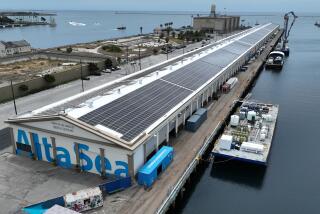High-tech incubator Blueseed not the first to target high seas
- Share via
PALO ALTO -- Forget building a startup.
Max Marty and Dario Mutabdzija want to build a startup colony.
And they want to put it in the Pacific Ocean –- out of the reach of restrictive U.S. immigration laws they say keep high-skilled immigrants from building the next Apple or Facebook in Silicon Valley. Check out this article from Wednesday’s paper for more on their project.
As outlandish as this scheme may seem to some, these are not the only entrepreneurs to boldly cast their fortunes off the shores of California to escape the restraints of government regulation.
Marty and Mutabdzija met while working at The Seasteading Institute. Blueseed borrows from seasteading — the libertarian idea to create floating cities championed by Patri Friedman, a former Google engineer and the grandson of economist Milton Friedman, and backed by venture capitalist and hedge fund manager Peter Thiel. Seasteaders want to build a flotilla of new sovereign nations on oil rig-like platforms anchored in international waters where people could live free from the burdens of taxes and government.
Seasteaders weren’t the first in California to target the high seas.
In the mid-1960s, a group — including former television and film actor Joe Kirkwood Jr., who played comic strip boxer Joe Palooka; former bank executive Richard Taggart; and Robert Lynch, president of a savings and loan — tried to ground an old World War II freighter on the Cortes Bank, a giant reef 110 miles off the coast of San Diego, at a shallow point and use it as a station to gather and process abalone with the ambition of eventually building a new island resort. But the freighter ended up in deeper waters — and in hot water with the U.S. attorney. The new sovereign nation of Abalonia was abandoned before it began.
A group of Seattle developers also tried to construct an artificial island on the Cortes Bank with rock and topsoil imported by barge from Mexico. The sovereign island of Taluga would have had sewers, a power system and a desalinization plant to supply fresh water. The U.S. put a stop to the project by declaring the reef — as part of the continental shelf — U.S. territory.
Marty and Mutabdzija’s ambitions for Blueseed are not quite that grand. They want to park a cruise ship 12 nautical miles off the coast of Northern California in international waters. Foreign-born entrepreneurs would live and work on the ship, building start-ups within commuting distance of Silicon Valley. That way, they wouldn’t have to get work visas, just business tourism visas that would let them ferry back and forth to Silicon Valley once or twice a week.
The Ayn Rand-esque project has been mocked as “Atlantis Shrugged.”
“It’s just a fundamentally flawed idea. It’s the sort of idea that occurs to people if you have read one too many Ayn Rand novels,” said Paul Saffo, who heads foresight at Discern Analytics. “Let’s face it: Kevin Costner demonstrated that it also makes a very bad movie.”
All the “Waterworld” jokes aside, Marty and Mutabdzija say they are very serious about Blueseed.
“I really love to live and work in Silicon Valley with all of these successful, awesome companies being born here and creating products and services,” Mutabdzija said. “People from around the country can move to Silicon Valley easily, but people from other parts of the world can’t do that. There are many smart people living all over the place with awesome ideas but scaling and growing those ideas into actual products and services that people will buy is difficult. You have to have the kind of ecosystem you have here.”
ALSO:
Silicon Valley status symbols emphasize mind over material
Ex-Facebook insiders building next wave of Silicon Valley firms
Idea is floated for a start-up colony anchored in the Pacific Ocean
More to Read
Inside the business of entertainment
The Wide Shot brings you news, analysis and insights on everything from streaming wars to production — and what it all means for the future.
You may occasionally receive promotional content from the Los Angeles Times.










